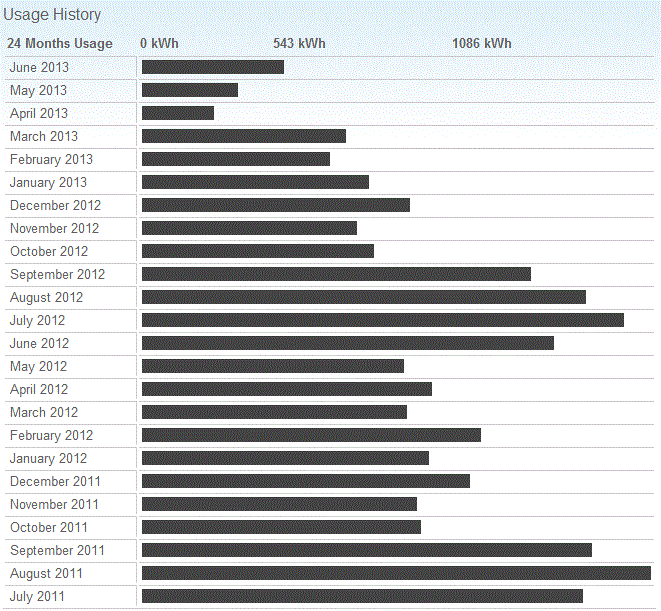As I promised four weeks ago, I have the final data on moving all my stuff to Windows Azure. I delayed posting this data because Azure pricing recently changed, as a number of services went from Preview to Production and stopped offering 25% discounts.
The concrete results are mixed at the moment, though increasing within the next couple of months. The intangible results are much, much improved.
First, electricity use. Looking at comparable quarters (March through May), my electricity consumption is down two thirds—even before air-conditioning season:

Consumption from March-May 2013 was 1028 kW/h, compared with 3098 kW/h over 2012. But this explains why the concrete benefits will improve: during June-August 2011, when all of the servers were running and so was the air conditioner, use was 4115 kW/h. I'm expecting to use less than 1800 kW/h this summer, just a little more than the one-month consumption in June 2011.
Costs, alas, have not fallen as much as hoped, unless you add the replacement costs of the servers. I'm currently running 3 SQL Database servers (consuming 2 GB), 3 extra-small cloud service instances, 1 small virtual machine, and 55 GB of storage. Total cost: $150.
Electricity in June 2013 was $55, compared with $165 in June 2012.
Don't forget the Office 365 subscription to replace my Exchange server at $26.
Finally, DSL and phone service went down from $115 to $60, because I dropped the phone service. Temporarily I'm supplementing the DSL with a FiOS service for $30. In a few months, when AT&T bumps the FiOS from 1.5 Mbps to 30 Mbps (they promise!), FiOS will go up to $50 and the DSL will go away.
So, cash flow for June 2012 was $279, and for June 2013 was $289. Factoring in the variability of electricity costs means Azure costs exactly the same as running my own rack.
What about the intangible costs? Well, let's see...I no longer have 8U of rack-mounted servers spinning their cooling fans 24/7 in my Chicago apartment. When I shut them off, the place got so much quieter I could hardly believe it. And I no longer worry about the power going out and losing email while I'm out of town.
In other words, I'm literally sleeping better.
Also, moving to Azure forced me to refactor my demo site Weather Now so extensively that I can now add a ton of really cool features that the old design couldn't support. (Once I have free time again. Someday.)
When you consider as well the cost of replacing the three end-of-life servers ($6000 worth of hardware), the dollars change considerably. Using 60-month depreciation, that's $100 per month savings on the Azure side of the ledger. I'm not counting that, though, because I may have limped along for a couple more years without replacing them, so it's hard to tell.
So: dollars, same; sleeping, better. A clear win for Azure.